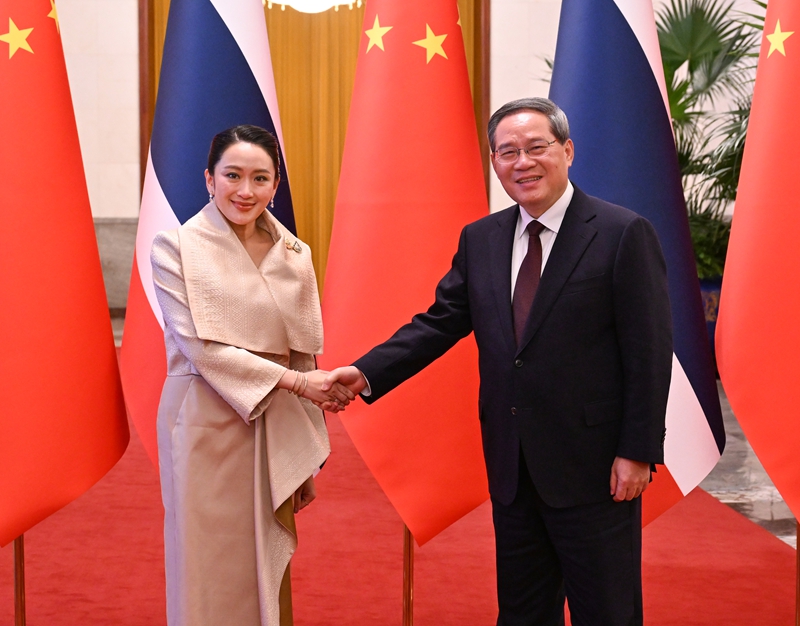Deeply Understand "Don't Let The Boundary Issue Define The Overall China-India Relationship"
Deeply Understand "Don't Let The Boundary Issue Define The Overall China-India Relationship"
On the afternoon of August 31, the Chinese head of state met with Indian Prime Minister Modi who came to China to attend the 2025 Shanghai Cooperation Organization Summit at the Tianjin Wedding Hotel, proposing to strengthen strategic communication and deepen mutual trust;
On the afternoon of August 31, the Chinese head of state met with Indian Prime Minister Modi who came to China to attend the 2025 Shanghai Cooperation Organization Summit at the Tianjin Wedding Hotel, and proposed four requirements: strengthening strategic communication, deepening mutual trust, expanding exchanges and cooperation, achieving mutual benefit and win-win results; taking care of each other's concerns, insisting on harmonious coexistence; strengthening multilateral cooperation, and safeguarding common interests. After carefully reading the press release, I think the requirements put forward are high-level and highly targeted, and are worthy of the joint understanding and implementation of both China and India. Among them, the most important thing is to deeply understand and grasp the sentence "Don't let the boundary issue define the overall Sino-India relationship."
The so-called "projective" is to grasp and promote China-India relations.
As two large developing countries with a population of over 1.4 billion, they are also southern countries in the world. They have many common interests, and there are not 1,000 reasons to deepen cooperation, and there are hundreds. However, China-India relations have caused some turbulence from time to time. What is the reason? It is because there is a territorial dispute between the two sides. The main reason is that India has a bit of a big appetite and wants to transform the stolen Chinese territory into Indian territory. If China does not agree, India will make some small moves from time to time to challenge China's patience and bottom line. When China fought back, they shouted loudly, regarding China as a threat and hatred. They not only refused to participate in the Belt and Road Initiative, but also attempted to help the United States become a backer and threatened China with the so-called "India, America, Japan and Australia mechanism" and "Indo-Pacific framework".
This of course aroused strong disgust and righteous indignation from the Chinese, and calls for the recovery of the territory occupied by India in southern Tibet as soon as possible.
The Sino-Indian border dispute has become the main bottleneck restricting the development of China-India relations. The momentum to define the entire China-India relationship based on the boundary issue exists in both China and India. Now, China emphasizes that it is not necessary to use boundary issues to define the entire China-India relationship, which is obviously targeted.
I understand that the Sino-India border issue is a problem, but from the perspective of China's national strategy and the prosperity and development of the Eurasian continent, this problem is far from a particularly big problem, nor is it an urgent problem that must be addressed first.
First, from the perspective of modern boundary concepts, the Sino-India border dispute can be completely slowed down and dragged down. There are at least four borders ahead of this controversy. 1. Space boundary. Now, the era of great aerospace has arrived, and the land grabbing in space has begun. According to the principle of whoever takes over first, China cannot lag behind. The key is that space is a homeless land. If China has the ability to take over, it must take over the top first. 2. Ocean boundaries. The key point is the South China Sea border. Now, there are several foreign ghosts within the border of China's South China Sea that cannot be left and must be resolved quickly. Against the backdrop of great navigation, the ocean boundaries are drawn by land and islands. China is 12 nautical miles outside the sea baseline, plus internal water and 200 nautical miles of exclusive economic zone, and an island is a large area. More importantly, the South China Sea islands and reefs are also related to maritime trade channels, and their strategic significance is absolutely uncommon. The third is the Taiwan issue. This is one of the three major tasks facing the great rejuvenation of the Chinese nation. In the face of the complete reunification of the motherland, liberating Taiwan Island and its territorial waters and exclusive economic zones around the island, the dispute over the Sino-Indian border is nothing. Fourth, market boundaries. China is a globalized country, and China's market boundaries have long extended to every corner of the world. Ensuring peace and security of China's market boundaries is of great importance to the great cause of China's strong country building a national rejuvenation.
In this case, how should China handle the Sino-Indian border dispute? Delaying and slowing is undoubtedly the best strategy. Until the more important border problem is solved, you must never fall into the Sino-Indian border trap. This is what the so-called "little unbearable" means "too many big plans".
Second, in terms of today's world pattern, the contradiction between China and the United States is the main contradiction, while the contradiction between China and India is the secondary contradiction. The United States is the main opponent that China must deal with, and India is the object that China needs to unite and strive for.
Under such circumstances, China cannot give priority to the Sino-Indian border issue, which is not urgent, to push India to the United States, and to increase the difficulty and entanglement of China's response to its major geopolitical opponents.
This is true for China, and isn’t India the same? If China and India showdown on the border issue and put it into force, India has no chance of winning, which will only bring disastrous consequences. At the same time, the United States is now obsessed with "making America great again" and "America first", engaging in national capitalism internally, pursuing "tariff imperialism" for the world, and engaging in a "new type of imperial tribute system" for allies, which is selfish in a nutshell. Trump unilaterally imposed a 50% tariff on India, proving that India is simply unreliable to help it help. India's future is still in Asia and the Eurasian continent, and it is in cooperation with China for win-win results. Being alienated or even hostile to China due to border disputes is not the best or the middle, but the worst strategy that is not worth the loss.
To sum up, China's proposal to "not use boundary issues to define the entire China-India relations" has great strategic sunshine. China-India relations should look forward and move forward together according to the head of state. As for the "China-India border dispute", we will leave time to negotiate carefully and take it slowly, and find a plan that both sides can accept through negotiations, adding icing on the cake to China-India relations.





